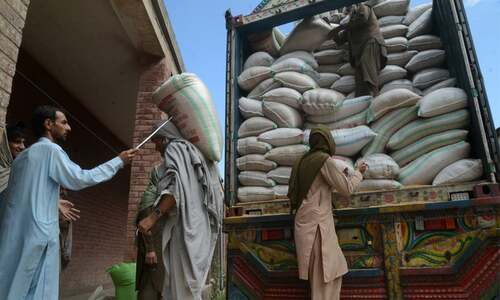LAHORE: The 6th International Thaap Conference, titled “People’s History of Pakistan” began here on Friday harking back to chapters of Pakistan history hitherto marginalised by the establishment.
The conference will continue till Sunday. It has been organised by Thaap (Trust for History, Art and Architecture of Pakistan) in Gulberg-III in collaboration with the Kinnaird College for Women University and the Higher Education Commission.
The opening day consisted of paper reading sessions in which scholars participated.
The first session was chaired by historian Dr Mubarak Ali who said the history of the united India and Pakistan highlighted the official version only, adding that there was need to reconstruct it with the facts and figures. Bhagat Singh and his comrades too had taken part in the independence movement and therefore they should be accordingly mentioned in the chapters of history, he said.
Meher Ali, a Bachelor of Arts in History from Brown University, US, and a Fulbright research fellow in Dhaka, Bangladesh, in her paper, “The Hidden Left: Communist Activity and Influence in Pakistan’s Early Years” focused on the historical writing on Pakistan’s earliest years that had long been dominated by the nationalist narratives.
The paper was aimed at recovering one such alternative vision of the political Left (the Communist Party of Pakistan) which, she said, despite the failure to impact political change, inserted a progressive perspective into Pakistani politics and culture.
Ms Ali said initially 50 members of the Indian Communist Party had formed the Pakistan Communist Party soon after the country’s inception in 1947. But they had to go underground because the authorities did not accept their politics. The party’s all wings were banned in 1954 after the so-called 1951 conspiracy for which Faiz Ahmad Faiz and Sajjad Zaheer were arrested.
Zainab Fatima read out the paper of Dr Hanifur Rehman, lecturer at the University of Peshawar and Jamshed Khan, a visiting research scholar at SOAS, University of London. The paper, entitled “Irony of History: Pakhtunistan, Bacha Khan and Afghanistan” evaluated questions like why Abdul Ghaffar Khan raised the issue of Pakhtunistan when the referendum for Pakistan versus Hindustan was being conducted in joint India, and why he did not demand for the Pakhtun region on the eastern side of the Durand Line to be merged into Afghanistan.
Dr Riaz Ahmed Shaikh, head of Social Sciences at Shaheed Zulfikar Ali Bhutto Institute of Science Technology (SZABIST), Karachi, in his paper, “Peasant uprising in East Bengal/ East Pakistan (1946-50)”, discussed an important chapter of the East Bengal’s peasant’s struggle for their legitimate rights.
Sultan Syed Bukhari read out the paper of Mr Towhidul Islam, CEO and Project Director at Idara Baraye Taleem-o-Taraqi in Swat. The paper, entitled “Political Organism of Pakistan: Examination of Political Structure of Local Bodies in Pakistan” focused on different forms of political systems like presidential, parliamentary, federation and one unit that had been exercised in the country.
The second session was chaired by architect Ahmed Pervaiz Mirza. Samina Iqbal read a paper on “Sheikh Safdar Ali and the Emergence of Modern Avant-Garde Art in Pakistan”.
In her paper, Dr Kanwal Khalid, associate professor at College of Art and Design, University of the Punjab, elaborated that the paintings of Lahore had provided an insight into the history of the city. In the early years of the 19th century, Lahore was under the Sikh rule and its grandeur and demise could be seen through the art of that time.
Aisha Asim Imdad, an artist, educationist, designer and associate professor at COMSATS Institute of Information Technology, Islamabad, in her paper explored colorful truck art and interpreted the decorative elements to understand the ideas the images portrayed.
In her paper, Sadia Pasha Kamran, a designer and teacher of art history at Kinnaird College for Women, said cynicism, mockery and satire were a part of the popular culture of Pakistan.
Earlier, Rt Rev Alexander John Malik and HEC Punjab chairman Muhammad Nizamuddin presided over the inaugural session of the conference and appreciated the organizers for gathering so many celebrities of different fields of life. Thaap CEO Prof Sajida Haider Vandal introduced the Thaap.
Conference organizer Prof Pervaiz Vandal also spoke.
The conference and Thaap photography exhibition will continue till Sunday. Thaap Film Screening at PILAC Auditorium will be on Monday, Student Jamboree on Tuesday and Thaap Performing Arts Festival on the Wednesday at Alhamra Cultural Complex, Qadhafi Stadium.
Published in Dawn, November 7th, 2015
On a mobile phone? Get the Dawn Mobile App: Apple Store | Google Play











































Dear visitor, the comments section is undergoing an overhaul and will return soon.